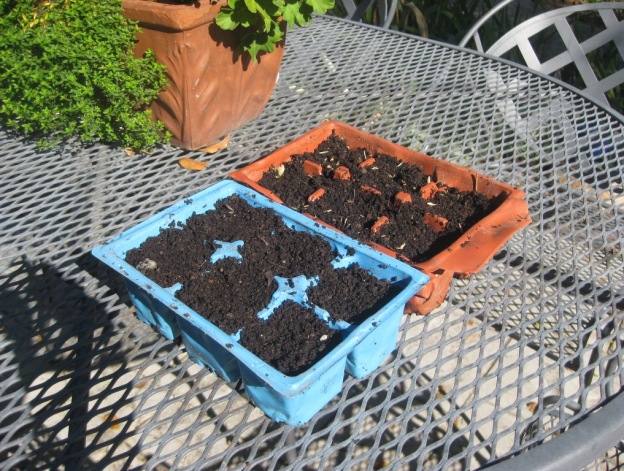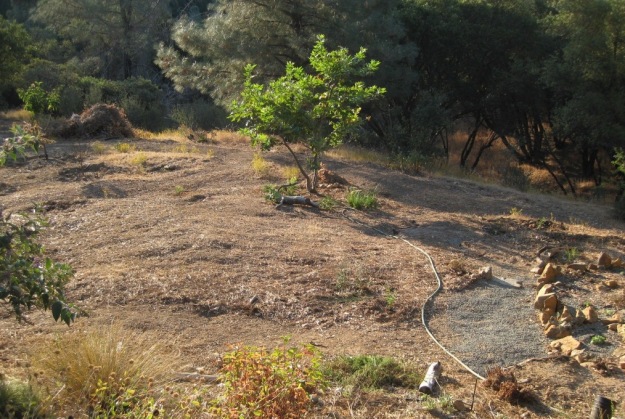Let’s check for progress on the meadow!
Last update for Fall 2010 …next Winter!
Before the latest rainstorms, new photos were taken of progress on my little seedlings in an area chosen for a meadow. Here, was a field of weedy filaree, awful weeds with seeds that form curlicues that screw themselves into our Corgi, Maggie’s fur in the spring and summer. Since filaree is not a CA native, the decision was made to eradicate as much as possible. The original post tells the details.
Test pony paks were planted the same day as the ground so I would know by sight which seedlings were meadow plants and which were weeds. The blue pak has the native wildflower mix and the orange has the native grass and wildflower mix, which does include one variety, ox-eye daisies, that is not CA native, but welcome in this case.
At the back is a Sycamore tree, planted in 2006, from a 5 gallon can, about 15 feet tall now. Along the right side is a winding gravel path that divides the meadow area from a rock garden, also new this year.
In November, the area was blanketed in snow and I feared for the branches of the sycamore! It still had many leaves, due to our nice warm fall and they caught the snow, bending nearly to the ground. I don’t stake trees because that actually weakens them so… it has survived, and the snow melted with no broken branches.
As for the seeds, being natives they should be fine through the usual California weather conditions. Talk about winter sowing, huh?
Fast forward to middle of December, and the seedlings in the test paks have shown themselves. I still don’t know what is what among the wildflower seedlings, but you can definitely tell which is flowers, and which is grasses.
In the meadow itself the same little seedlings as in the pony paks are visible, spread rather unevenly since I hand sowed them. That is fine and I believe that will give me a natural look rather than a lawn look. Since plant growth slows down so much in the colder months these sizes are to be expected.
Checking, also, the perennials planted around the edge of the ‘meadow’, there is already new growth starting at the base of the dried stems of the main plants. Hope for Spring! I am excited about so many new Agastaches, which is a new plant for me.
I am planning on having to weed pretty conscientiously, to keep the well-known filaree seedlings out. When ever there is good weather, I’ll start that now. I imagine that in two more months there will be a more dramatic change.
How to sow wildflower seeds article by Judith Larner
Wildflower FAQ by Wildseed Farms
***
The Meadow project, month by month
What am I really doing in the garden in October? Planning and removing weeds
Do you dream of a natural and beautiful wildflower meadow? Finding and sowing seeding
Let’s check for progress on the meadow! Weeding and watching the weather
How to weed a meadow in the Sierra Foothills More weeding…letting the sprouts thrive
Let’s check on Fall and Winter projects! Identifying seedlings
The wildflower meadow in May Small triumphs
My California native meadow in June Starting to bloom
The midsummer meadow The peak bloom
Stomping down the Autumn meadow Neatening up
Native California meadow in the second year
Recent Posts
How to Be a Lazy Gardener
...and still have a pretty garden With a busy household and jobs, we are…
Summer is Spring at Whiskey Falls!
Take a day trip to Whiskey Falls... Come visit Whiskey Falls and the surrounding high…
California oak acorns: Feast or famine
Why do oaks drop more acorns some years and not others? If you have live…
Mule’s ear and Farewell to Spring
Roadside treasures worth stopping for In the first week of July in the Sierra foothills…
Our favorite butterfly plants
Wow! Butterflies love these plants! Grow any of these for instant results and each is…
A water-saving veggie garden for the foothills
Your water-wise veggie garden Does everyone in our Mountain Community grow at least one tomato?…


